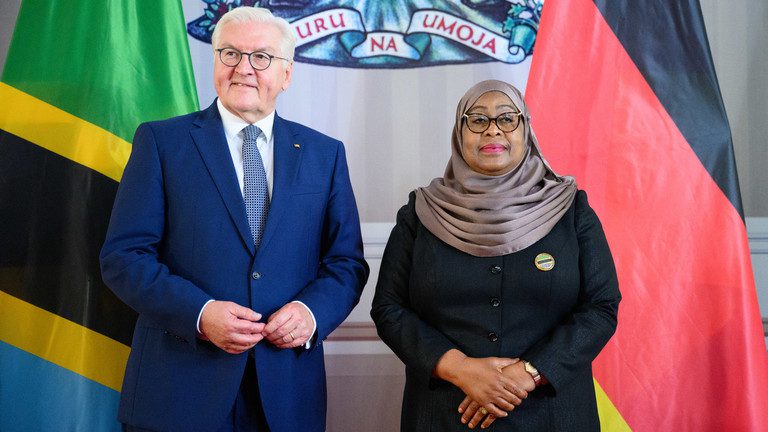Africa
Germany will initiate negotiations with Tanzania regarding their colonial legacy

Berlin’s relations with its former colony are tarnished by historical horrors, the German president stated.
President Frank-Walter Steinmeier announced on Tuesday that Germany will begin discussions with Tanzania to resolve the effects of its colonial control in the East African nation, once known as Tanganyika.
During a three-day visit to the nation, Steinmeier met with President Samia Suluhu Hassan in Dar es Salaam and declared, “We must not forget the past.”
Tanzania, which was ruled by Germany from 1885 until 1918, filed a lawsuit against Germany in 2017. Tens of thousands of people were slaughtered and subjected to torture by German soldiers during the Maji Maji insurrection in 1905–1907, and the African nation is demanding justice for them. Most Tanzanians perished from malnutrition as a result of German forces purposefully destroying the region’s food supplies as retaliation for resistance to colonial control.
Steinmeier asserted on Tuesday that the three decades of German colonial rule had “overshadowed atrocities” in the relationship between Tanzania and his nation.
He stated, “It is important to me that we accept this difficult chapter and that we accept it together.”
The German Chancellor further declared that Berlin was willing to work with Dar es Salaam on the “repatriation of cultural property and human remains,” and he announced preparations to visit with those impacted by the Maji Maji insurrection.
READ ALSO: Both Kenya and Tanzania are applauded for their visa decision
Politicians and activists from Tanzania have been calling for payment and the return of human remains that are presently on exhibit in German museums.
In her “in-depth” discussions with Steinmeier, Tanzania’s president affirmed that they had begun “negotiations to see how we are going to agree on the German colonial legacy.”
In 2021, Germany expressed regret to Namibia (previously South West Africa) and acknowledged that, between 1904 and 1908, it had committed genocide against the Herero and Nama peoples. Approximately 10,000 Nama and 65,000 Herero tribe members were slain by German forces as they rebelled against colonial land seizures. Berlin signed a peace pact with Namibia that includes providing reparations for the event, which is considered to be the first genocide of the 20th century, totaling more than €1 billion ($1.05 billion).
As part of his African tour, Steinmeier is expected to visit Zambia from Wednesday to Friday. According to Steinmeier’s office, this will be the first visit to the country of southern Africa by a German federal president.
While no apologies were offered, King Charles of Britain, who arrived in Kenya on Tuesday for a four-day official visit, acknowledged that Kenyans had endured a “painful struggle for independence and sovereignty” and that “abhorrent and unjustifiable acts of violence” had been done against them.
The former colony of the United Kingdom, which it administered from 1901 to 1960, is putting pressure on the country to apologise and make amends for injustices that occurred there, including the murder of thousands of Kenyans who demonstrated against colonialism.
